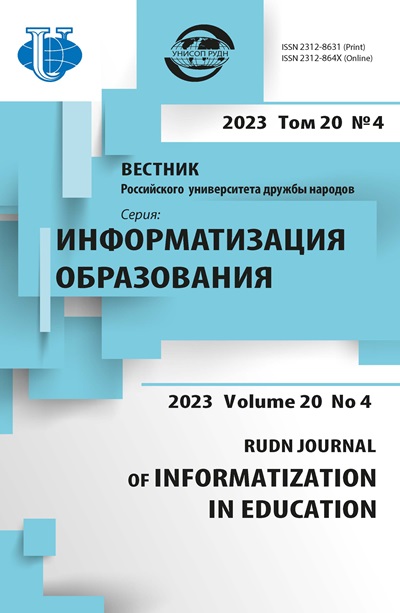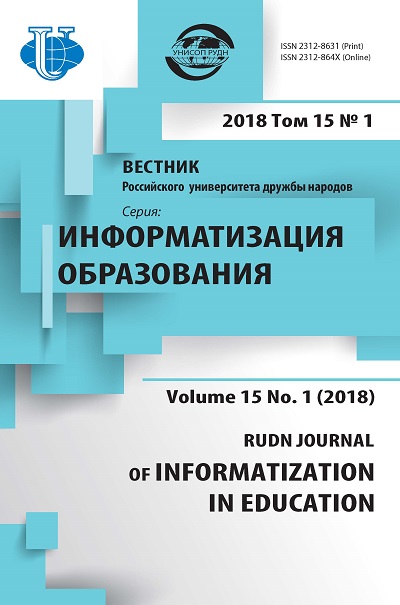Review of information technologies and their importance in the educational directory of education
- Authors: Ivanov A.V.1
-
Affiliations:
- Moscow city pedagogical university
- Issue: Vol 15, No 1 (2018)
- Pages: 107-113
- Section: FORMATION OF INFORMATION EDUCATIONAL MEDIUM
- URL: https://journals.rudn.ru/informatization-education/article/view/18058
- DOI: https://doi.org/10.22363/2312-8631-2018-15-1-107-113
Cite item
Full Text
Abstract
The article focuses on the fact that the need for education is continuous and ongoing process therefore anytime anywhere access to it is becoming a necessity. The need for information is constantly increasing phenomenon. Education should meet the needs of different groups of learners, and therefore, modern information technologies are important to meet this need. Discusses the requirements of society, which consist in the fact that all the members of this society have the necessary level of technological literacy. Thus, increasing access and reducing the cost of education with the aim of achieving the planned quality of education possible to implement cloud-based IT technologies. Sets out the specifics of cloud computing, which imposes special requirements for training in their use, including the management of educational process. Draws conclusions about what information and communication technologies, understanding the capabilities of cloud technologies and their impact on the management efficiency of the education system, are the main prerequisites for the development of professional competence of the head of the educational organization in the field of information technology.
About the authors
Andrey Viktorovich Ivanov
Moscow city pedagogical university
Author for correspondence.
Email: z.oy@mail.ru
postgraduate student of department of informatization of education Moscow city pedagogical University
Sheremetyevskaya str., 29, Moscow, Russia, 127521References
- Andreev A.A. Teoretiko-metodologicheskij podhod k proektirovaniju i realizacii setevogo obrazovanija [Theoretical and methodological approach to the design and implementation of network education]. Internet-tehnologii v otkrytom obrazovanii [Internet-technologies in open education]: Materialy seminara. M.: MJeSI, 2000. 224 p.
- Andreev A.A., Soldatkin V.I. Distancionnoe obuchenie: sushhnost’, tehnologija, organizacija [Distance education: essence, technology, organization]. M.: MJeSI, 1999. 167 p.
- Beljaev G.Ju. Pedagogicheskaja harakteristika obrazovatel’noj sredy v razlichnyh obrazovatel’nyh uchrezhdenijah [Pedagogical characteristics of educational environment in different educational institutions]. M.: ICKPS, 2000. 318 p.
- Vygotskij L.S. Pedagogicheskaja psihologija [Pedagogical psychology]. M.: Pedagogika, 1991. 480 p.
- Efanova T.I., Ivanov A.B., Savickij S.K., Habibulin Je.M., Koshkalov E.S. Informacionnoobrazovatel’naja sreda vuza [Information educational environment of the University]. Novoe slovo v nauke: perspektivy razvitija [New word in science: perspectives of development]: materialy VII Mezhdunarodnoj nauchno-prakticheskoj konferencii. Cheboksary: CNS «Interaktiv pljus», 2016. Vol. 1. No. 1 (7). Pp. 195—199.
- Zaslavskaja O.Ju. Informatizacija obrazovanija: novoe ponimanie mesta i roli uchitelja v uchebnom processe [Informatization of education: a new understanding of the role and place of teachers in educational process]. Vestnik Moskovskogo gorodskogo pedagogicheskogo universiteta. Serija «Informatika i informatizacija obrazovanija» [Bulletin of the Moscow city pedagogical university. “Informatics and Informatization of Education” series]. 2007. No. 9. Pp. 81—82.
- Zaslavskaja O.Ju. Osobennosti povyshenija kvalifikacii uchitelej v oblasti ispol’zovanija internetservisov novogo pokolenija [Features of teacher training in the use of Internet services of new generation]. Vestnik Moskovskogo gorodskogo pedagogicheskogo universiteta. Serija «Informatika i informatizacija obrazovanija» [Bulletin of the Moscow city pedagogical university. “Informatics and Informatization of Education” series]. 2012. No. 23. Pp. 76—85.
- Zaslavskaja O.Ju. Sovershenstvovanie professional’noj i upravlencheskoj kompetentnosti prepodavatelja v svjazi s vnedreniem informacionnyh tehnologij [Improving the professional and managerial competence of the teacher in connection with adoption of information technology]. Nauka i shkola [Science and school]. 2006. No. 3. Pp. 52—54.
- Makarchuk T.A., Minakov V.F., Artem’ev A.V. Mobil’noe obuchenie na baze oblachnyh servisov [Artemyev Mobile learning based on cloud services]. Sovremennye problemy nauki i obrazovanija [Modern problems of science and education]. 2013. No. 2. URL: www.science-education.ru/1089066 (data obrashhenija: 16.11.2017).
- Osnovy otkrytogo obrazovanija [Fundamentals of open education] / Otv. red. V.I. Soldatkin. M.: NIIC RAO, 2002. Vol. 1. 244 p.
- Skibickij Je.G., Shabanov A.G. Distancionnoe obuchenie: teoretiko-metodologicheskie osnovy [Distance learning: theoretical and methodological foundations]: monografija. Novosibirsk: SIFBD, 2004. 249 p.
- Abu El-Ala N.S., Awad W.A., El-Bakry H.M. Cloud Computing for Solving E-Learning Problems URL: http://thesai.org/Downloads/Volume3No12/Paper_21-Cloud_Computing_for_ Solving_E-Learning_Problems.pdf (дата обращения: 16.11.2017).
- Adesanya O.O., Idogwu K.U. The Evolution of ELibrary in Nigerian Academic Libraries: Challengies and Way Forward. Asian Journal of Education and eLearning, 2013. Vol. 3(4). Pp. 49— 54.
- Reddy T.R., Kumar K. Open source software’s and their impact on library and information centre: An overview. International Journal of Library and Information Science, 2013. Vol. 5(4). Pp. 90— 96.
- Zaslavskaya O.Yu. Components of teacher’s management competency: knowledge and skills, activity, functional areas // American Journal of Pedagogy and Education. 2013. No. 2. Pp. 13.
















